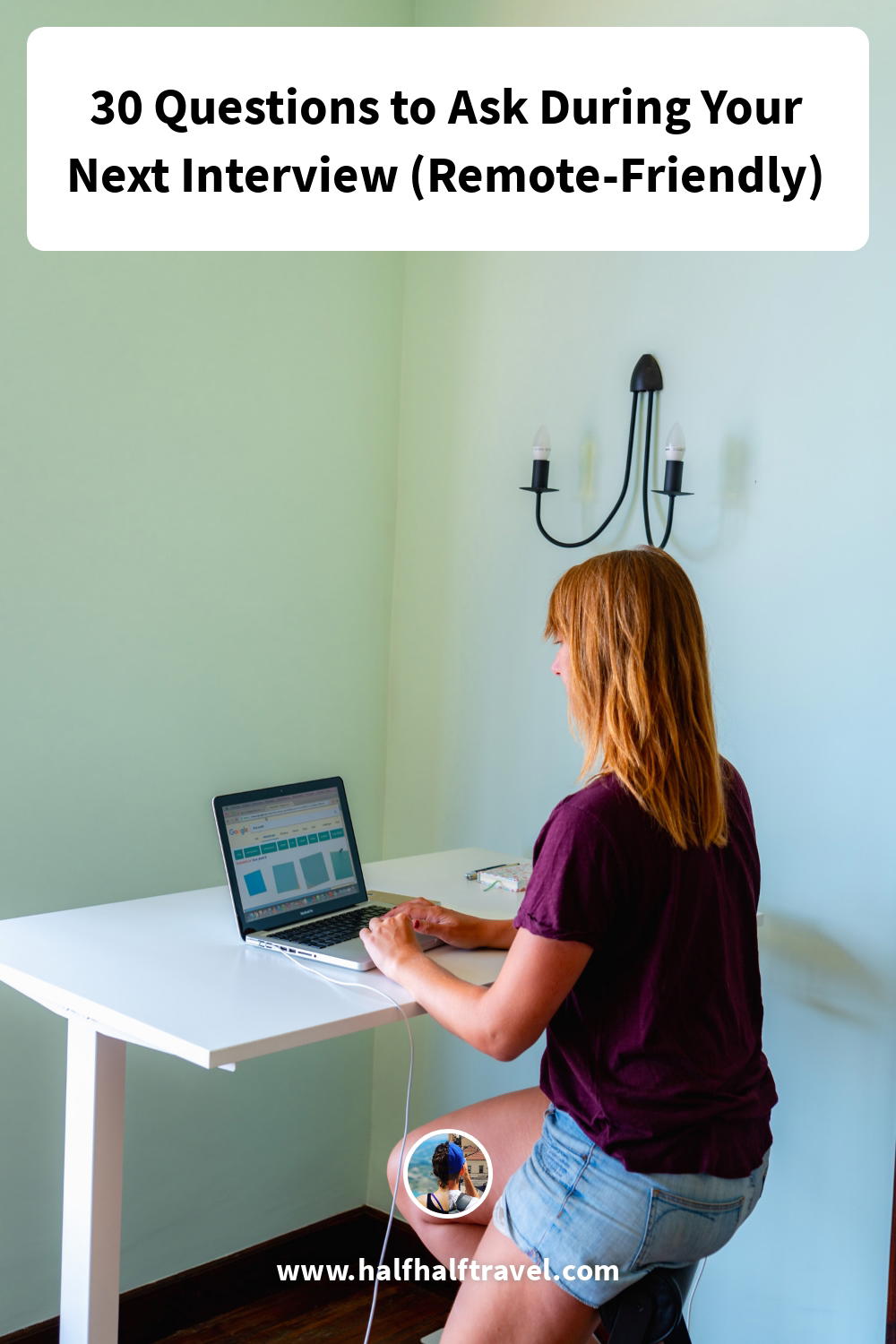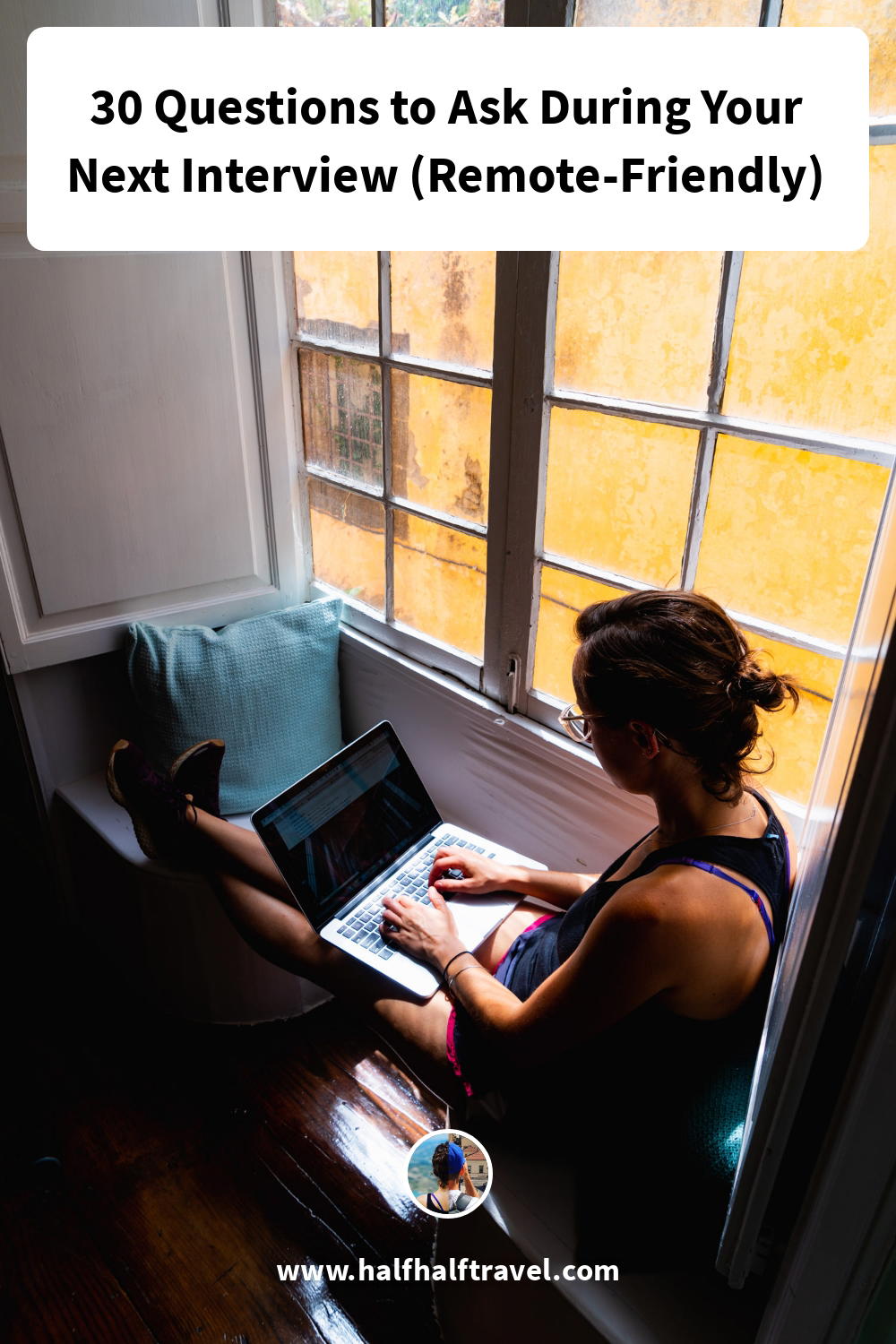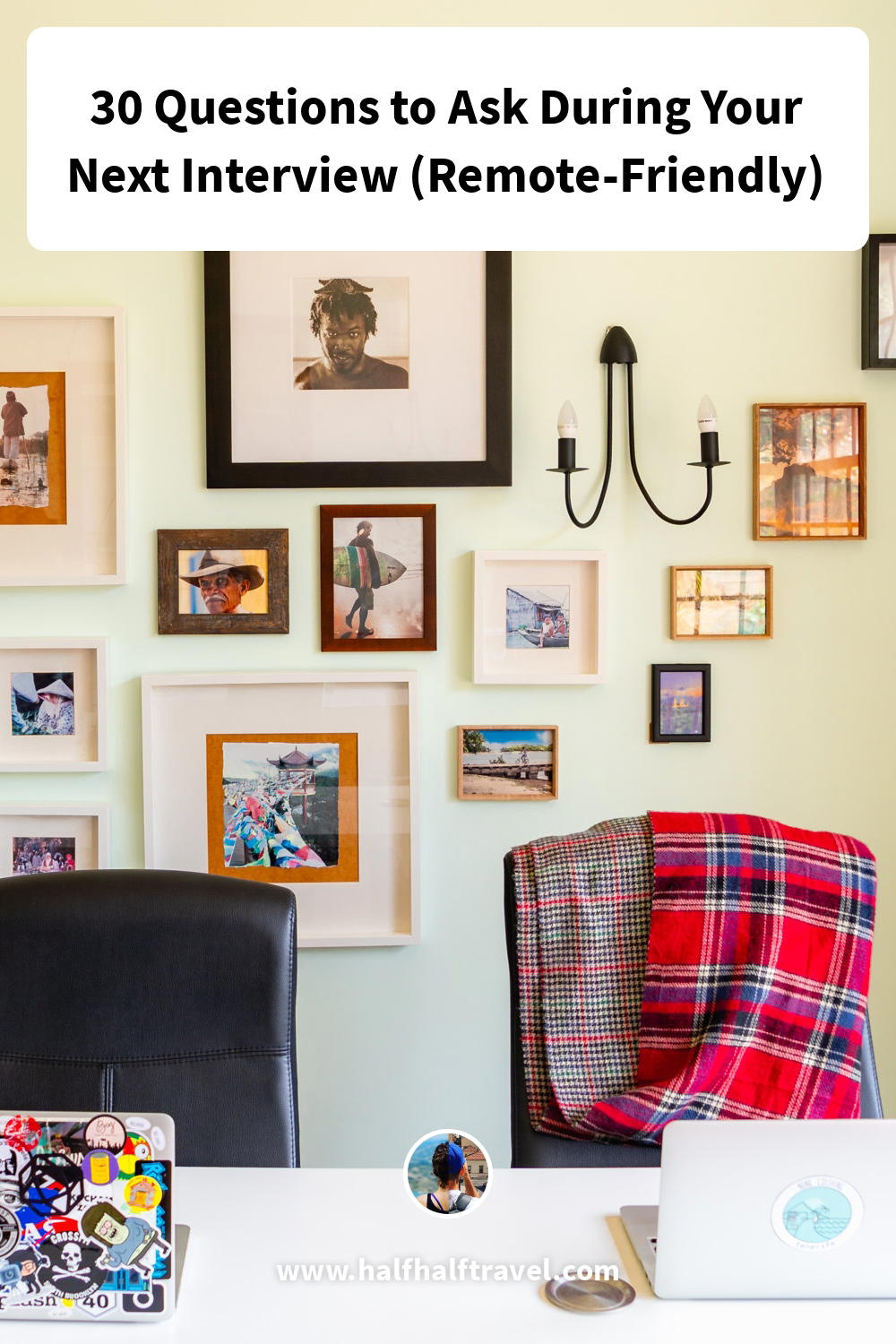30 Questions to Ask During Your Next Interview (Remote-Friendly)
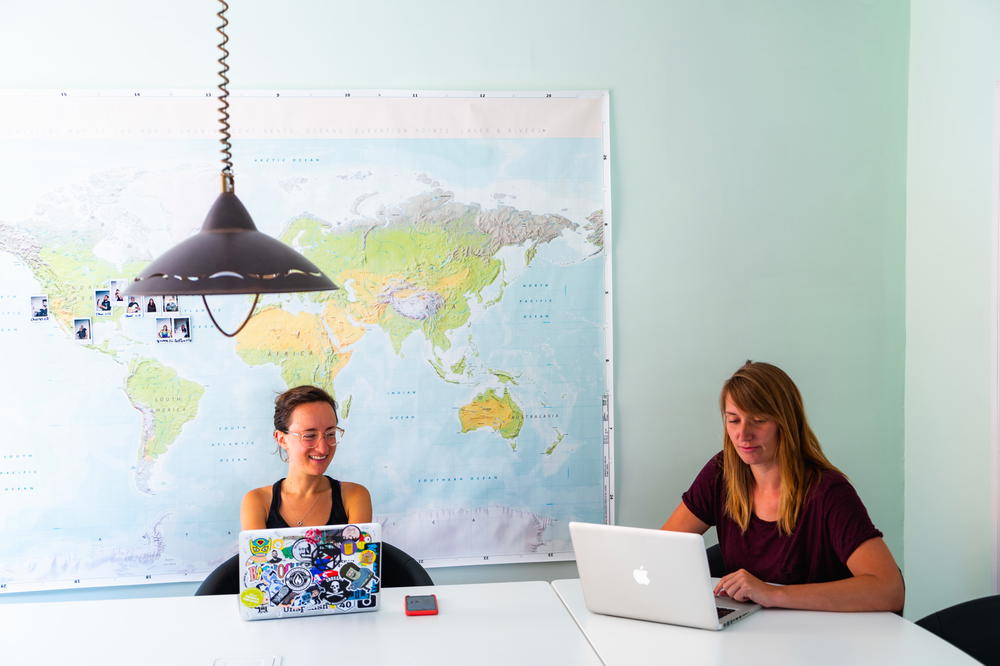
Having the right questions during the interview process will get you hired! Use these foolproof and remote-friendly questions to ask your interviewer to get the job you want.
This article may contain affiliate links. We earn a small commissions when you purchase via those links — and it's free for you. It's only us (Becca & Dan) working on this website, so we value your support! Read our privacy policy and learn more about us.
Interviews are import because there are the barrier between you and your next job. An interview is important for everyone involved. As someone interviewing for a job, you get the opportunity to ask questions, learn about the position and decide if you would like to work at the place you’re interviewing for.
For the interviewer, it’s an opportunity to learn about the candidate and evaluate them based on skills, personality and a number of other factors.
Dan and I both work full-time jobs in addition to writing this blog. Between the two of us, we have a lot of experience interviewing, collecting questions and getting hired, through the years!
Here, we share our list of questions that have helped us through the interview process in several industries. We hope you find this list helpful, as these are questions that we have really asked during interviews, and we’ve landed the jobs we dreamed of.
As you read this guide, don’t forget to continue all the way to the bottom, where you’ll see a ‘zinger’ bonus question that shouldn’t be left out of any interview!
If you’re on the hunt for a new remote job, check out our list of the best remote job boards that’ll help you get started.

Questions about the interview and hiring process
Every interview process is different, so it pays to ask about the interview process itself, especially in the first call with a recruiter. If you find that you’re still in the dark after a first round interview, you can surely conclude a first or second round interview asking what to expect in next steps.
Make sure to see our tips about selling yourself in your next interview.
If you want to get ahead of the questions someone might ask you, consider uploading your resume to PDF.ai. You’ll get an AI generated list of questions someone might ask you about your professional experience. Neat!
What is the interview process like?
Most interviews start with a quick phone screen. Companies vary with how many rounds they have. We’ve seen anywhere between three rounds to six rounds. Interviews definitely have kept us on our feet!
This is a helpful piece of information to know because it will help inform the rest of your interview process, whether a remote interview or in-person.
What are the next steps in the hiring process?
After each round, this is a great question to ask. You’ll get an idea of where you stand and when you can expect a response.
Will there be a final presentation or panel interview?
Some interviews culminate with a final presentation (we’ve both done these) or a panel interview, which may have anywhere between two to five people from the company asking you questions and seeing how you do.
What type of timeline can I expect from here?
This is a frank and useful question, because companies can be from here to there, in regard how quickly they plan to make a hiring decision. Some might be delayed by candidates’ timelines or vacations, and some might be looking to choose the #1 candidate for the offer, in 48 hours.

Questions about the role or job itself
You have every right to ask every question about the role for which you’re interviewing. This helps you find out if the job is right or wrong for you! A worst-case scenario would be you’re the type who dislikes business travel and you find out that a job is 50% travel in the final stages of an interview! Ask early.
Job-specific questions and how success is evaluated in the job go in this part.
In your opinion, what types of qualities does the person in this role need, to succeed?
I’ve asked this question before, because I genuinely want to know the answer and see what the interviewer says.
What do the first 30, 60 and 90 days of this job look like?
Interviewers like when you ask this question because it shows you are focused on benchmarks and real expectations of what you’d be working on, and how you’d be evaluated in this job.
Which types of methods for evaluation are used for this role and in this team?
You’ll want to know how your output and results will be evaluated. Are the methods for evaluation fair, or do they seem intimidating and lofty? Ask for clarifications and take notes.
How does this role interface with other teams?
Let’s say you really do like interacting with other teams at the company and working cross-functionally. We both do! Ask what the expectation is about how much interaction and collaboration this role has with other departments or leaders.
What kind of growth could I expect in this role after a year or two years?
You should always be asking about growth, especially if you currently come from a leadership position, or if you are seeking one.
What is the expected time zone that this role works in?
I’ve asked this question at interviews, because sometimes the answer is not what you think it is. If it’s an East Coast position, but the manager and the direct reports, AND the clients are on the West Coast, maybe the hours are actually 9-6pm …. Pacific Time. Conversely, if the role interacts with teams in Asia or Europe, the expected hours may be more ‘around-the-clock.’

What are some challenges that this role currently or will face?
This is a fair question to ask, because maybe this role is with an under-resourced team, or maybe it works with a slew of difficult or hard-to-manage clients. See if the interviewer has a good and reasonable answer for this and then determine if you’re ready for the challenge.
How does the company value this role?
If the role is entry-level versus senior leadership, the answer will naturally be quite different. Make sure the answer given by the interviewer matches your expectation.
Is this role remote, hybrid or in-person?
Very surprisingly, some companies may not comment on this topic in the first recruiter call, or even in first- and second-round interview if they think the answer is obvious. I’ve sometimes gotten to the third round of an interview with a company and still not known the answer. It’s something you’ll want to hear from the supervisor of the role, or the recruiter, or both. You wouldn’t want to take the offer and be in for a surprise!

Questions about professional development
If you’re interviewing, it is because you want to move from your current position to one where you can probably do something exciting and see more professional growth. An interview is a perfect time to ask about professional development!
What kind of opportunities are there for professional development at the company?
Maybe the company has professional development stipends that you can use toward our own selection of online classes, or maybe they consider professional development to be attending conferences every year. It pays to ask.
Is there a standard type of professional development that employees are receiving?
This goes with the question above. Are all employees awarded the same type of specialized or additional training, or does it vary by department?
Are there any types of trainings that will be available if it’s decided that I need to learn new skills or software?
No one can be 100% prepared for every job they take on, and for a new role, there may be software, platforms or skills to learn. How does the company expect that you’ll level up?

Questions about the company
Companies can be vastly different from one another. If you come from a tiny company and you’re interviewing at a massive one, or the other way around, you’ll want to know all about what you can potentially expect, during the interview.
This is a time to ask about company values and corporate or organizational culture topics. Here are our favorite questions.
What are the most important company-wide values?
Every company has different values. Some are regarding how employees treat one another, like respect, and some are about results and ambition. See if the company-wide values reflect what would make the company a good place to work at.
How do employees look forward to growing with the company?
Do employees have a future-forward perspective at the company? See what your interviewer says when they answer this one.
What’s unique, in your perspective, about growth at the company?
Maybe employees can be sped up toward a promotion if they hit targets in the first three to six months, or maybe there’s a rule that no one gets promoted for 18 months no matter what. Ask!
How would you describe the remote work culture?
Every company has a different sort of remote work culture, and I say that having seen quite a few post-COVID companies who treat the remote model or hybrid model very different. Is the company completely open to remote work or do they discriminate against it?
Are you set on finding a remote job this year? Don’t miss our guide to finding a new remote job with all the best practices you’ve been looking for.
How is company culture maintained even though teams are distributed?
For companies that have distributed teams and remote-first cultures, ask how company culture is maintained even if there is no physical central headquarters. Are there quarterly in-person meetups? Is culture maintained through Zoom happy hours for employees to stay connected? Or is there none, and it’s a work in progress? Some of this could be red flags, or could be awesome and welcome news to you.
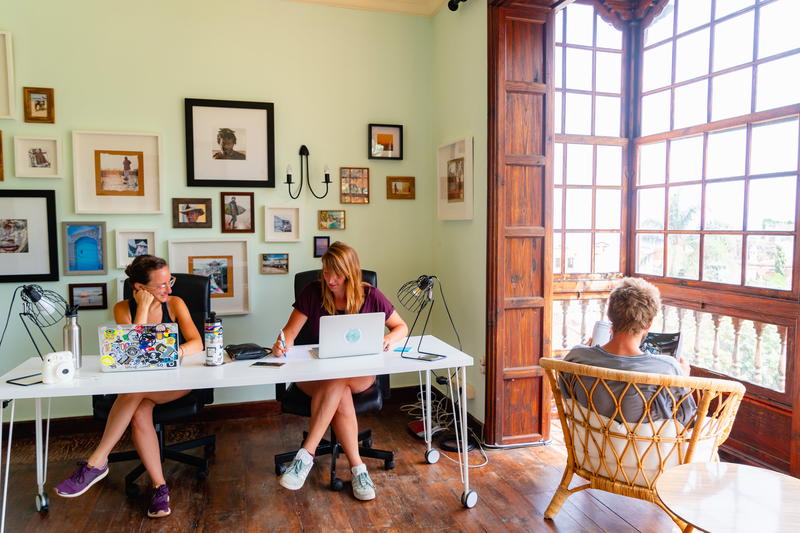
Questions for your team and interviewer
Get into the nitty gritty with your interviewer or the recruiter, because this is your chance to ask away. Ask things that are specific to their experiences with the company and with their roles, and how they see your position fitting in.
What originally brought you to the company?
Everyone likes to talk about what got them to where they are today! You may like to hear how your interviewer found his or her current role at the company.
How have you seen your role change and grow since you joined?
The interviewer may really like this question, as will the recruiter. Roles do tend to change, especially with high growth, or expansion of scopes and company-wide needs.
What do employees say is something unique about working here?
As the interviewee learning about a company that may hire you, ask what makes this organization special! Is this a place where you could see yourself? The interviewer can tell you.
How have you seen the company’s values shine through in your work and your team?
Some companies are firm that all company values and missions should be first and foremost in everyone’s work. Is that the case?
Is there any churn rate among employees of which I should be aware?
This is a touchy question, and you can ask it if you feel bold. If the interviewer answers honestly, it’s a good sign, especially if there is a reason for a high churn rate (this means that employees don’t stay long and leave the company sooner than when compared with other organizations).

Bonus questions to make you memorable and stand out
Here are a few ‘zinger’ questions I’ve used in interviews that do the following:
- Make me look like a positive-minded candidate for the job
- Impress the interviewers
- Get the interviewer talking about the future, which is always great
What is something you are most excited about in the company’s future?
Your interviewer may have a quick answer on this one, or may take a thoughtful moment to answer it. Either way, it is great for you to ask, with each person you speak with at the company during your interview experience, and it’s a great way to inspire positivity from your interviewer toward the end of your chat with them.
What is your most memorable experience in your role thus far?
I wish I asked this question more. If you have time, ask this one to your interviewer, because they might have a great question that also helps give you insight into the org.
Do you have any hesitations about my experience that I could clarify?
This is a bold question and it’s one that you need to ask! If you have any gaps on your resume, or if you lack a crucial skill that the job description asks, but if you have a way to prove you’re still the best candidate, this is the time when you can turn doubt into confidence.
Is there anything about my candidacy for the role you’d like to discuss before we conclude?
I’ve asked this question in interviews if we have a bunch of time left (if things went well) and sometimes, it turns into a valuable time to talk about final topics that weren’t touched on yet. Don’t be afraid to create more time to talk about yourself!

